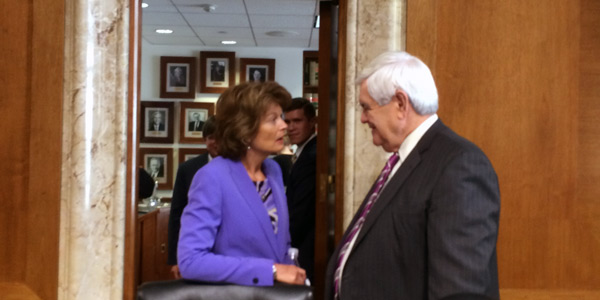By Wayne Barber
WASHINGTON — Senate witnesses agreed Thursday that the threat posed by electromagnetic pulse attacks is a major concern but differed on the adequacy of public and private efforts to protect the electric grid.
The Senate Energy and Natural Resources Committee heard testimony from six witnesses on EMPs, policy options for protecting energy infrastructure and improving capabilities for restoring the system after an attack.
Chair Lisa Murkowski (R-Alaska) said there is heightened concern over the threat of EMPs — blasts of electromagnetic energy from a nuclear weapon that can disrupt or destroy microprocessors and other electronic devices — because of the potential spread of nuclear weapons to nations such as North Korea and the ubiquity of electronics.
“This has magnified the impact, as compared to the potential impact in the 1960s, that an EMP burst could now have on the electric grid, the technologies that rely on electronics and our daily lives,” she said.
The broad discussion also veered into risks associated with cyberattacks as well as naturally occurring geomagnetic disturbances (GMDs).
Bleak Picture

The bleakest pictures were painted by former House Speaker Newt Gingrich and Ambassador Henry F. Cooper, a Ph.D. engineer and former director of the Defense Department’s Strategic Defense Initiative.
Cooper said that most federal and state efforts to safeguard the electric system against low-probability, high-risk attacks have been “grossly inadequate.” He said the U.S. government has not devoted enough attention to EMP attacks that are “known to be included in the doctrine and planning of Russia, China, North Korea and Iran.”
Because no defense is perfect, Cooper said more effort should be made to “harden” critical infrastructure against “the full complement of threats.”
Gingrich said that while North America has done an excellent job of developing an efficient electric grid, this efficiency makes it inherently “fragile.”
A widespread grid failure that lasts a long time could be more damaging than the terror attacks of Sept. 11, 2001, Gingrich said. The former congressman, who wrote about the threat in a 2011 book, “To Save America,” alluded to the possibility of hospitals having patients die for lack of clean water and other services.
“Here we are gambling with our civilization,” Gingrich said. He also cited NASA research that he said suggests Earth could be overdue for a major solar storm that could disrupt much of the grid.
Government is on the Case
While the domestic electric grid is a “complex ecosystem” where disruptions can cascade, much work has been done to safeguard the power system, said Caitlin Durkovich of strategic consulting and advisory firm Toffler Associates.
“There is no doubt we live in a dangerous world,” said Durkovich, the Department of Homeland Security’s assistant secretary for infrastructure protection under President Barack Obama. “The bottom line is the risk to digital and physical infrastructure has grown and our critical infrastructure is more vulnerable than it was a few decades ago,” Durkovich said.
“I want to be clear: We have not ignored the threat of an EMP,” Durkovich told the committee.
Sen. Jim Risch (R-Idaho) also defended the government’s efforts to protect the grid. “These issues have not been ignored by the United States,” Risch said.
But many of the defense efforts are not something that can be discussed in public sessions, Risch said. At the same time, “there is not enough money in the world to protect us 100%,” he added.
FERC, EPRI Recap Ongoing efforts
Acting FERC Chair Cheryl LaFleur offered a rundown of FERC’s and NERC’s efforts to protect against grid disruptions.
The subject of EMP and GMD events have been the topic of “significant scientific research and debate, as well as broad discussion among regulators, elected officials, industry and other stakeholders,” LaFleur said.
In 2014, FERC directed NERC to develop a reliability standard that addresses physical security threats. (See FERC Approves GMD Reliability Standard.)
“As noted above, the GMD and physical security standards help provide protection against particular aspects of the EMP threat,” LaFleur said. “However, FERC has not directed NERC to develop a standard specifically targeting EMP. To be clear, I believe this is the result of reasoned consideration of the issue.”
Robin Manning, the Electric Power Research Institute’s vice president for transmission and distribution, briefed the Senate panel on his organization’s research on GMDs, EMPs and “high-altitude EMP” (HEMP) events.
“EPRI has been researching GMD for many years, with significant applications now implemented across the electric industry,” Manning said. “Implications and solutions for EMP and HEMP are less understood. Much of the available information is not specifically applied to electric utilities, making it very difficult for utilities and regulators to understand effective options for protecting energy infrastructure,” Manning said.
Lincoln Electric System CEO Kevin Wailes, co-chair of the Electricity Subsector Coordinating Council, testified on behalf of the American Public Power Association.
Wailes said he is skeptical of suggestions in some quarters that the power sector “fully gold plate” the entire grid so it could “theoretically, at least partially survive a high altitude nuclear event.” There is no consensus on what measures should be taken or how effective or costly they might prove, Wailes said.





